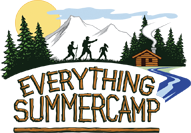Hey, Parents!
How can you know when your kid is ready to head off to summer camp? In the end, kids are their own best gauge of heading to camp at the right age. Kids naturally get wind of the summer camp idea from other kids talking about it or maybe a parent or grandparent who has shared some fond camp memories. My older sister went away during the summers and I was always curious where exactly she was going and what she was doing.
 When kids start asking questions about camp it’s usually a good sign: your kid’s thinking about it and getting curious about camp. Check out this excerpt from Parker P. who wrote in to us back in 2015 to share how he discovered camp.
When kids start asking questions about camp it’s usually a good sign: your kid’s thinking about it and getting curious about camp. Check out this excerpt from Parker P. who wrote in to us back in 2015 to share how he discovered camp.“When I was four, my mom read me a story called ‘The Berenstain Bears Go to Camp’. I was fascinated with the idea of going to camp and began asking when I could go. She was surprised that as such a young child I would express an interest in camp, but I loved the idea of the outdoors, the adventure, and the excitement.
Over the next couple of years, my mom became aware of Camp Ridgecrest for Boys and as soon as I entered first grade, she registered me to attend the next summer. I didn’t know anyone. She didn’t know anyone whose child had been.
She drove me to camp. Helped me set up my bed and trunk area, and headed to her car to depart. I was a little overwhelmed and so was she. Neither of us anticipated how hard it would be to separate that first summer, but I am so glad that she trusted the plan and the camp staff…I had immediately fallen in love with camp. Now after seven years at camp, I continue to look forward to camp as it’s the highlight of my summer.”
Maybe your kid hasn’t shown any interest in camp but you think they would enjoy the experience. A good approach might start something like this: “Did you know Grandpa was your age when he first went to camp? What do you think of going for a couple weeks?” Your child’s response ought to help you figure out where your kid stands with camp.
There’s an entire chapter dedicated to the subject in ‘The Summer Camp Handbook’, an amazing guidebook put together by two camp experts—Chris Thurber and Jon Malinowski. The chapter discusses other things to consider about your kid’s readiness for a camp stay such as their age, the length of the camp stay, their previous experience away from home, and more.
Check out this invaluable guidebook, ‘The Summer Camp Handbook’ when you click right here, published by and made available here at Everything Summer Camp! Till next time, Camp Folks. And, as always, thanks for reading!
- John






 Christopher Thurber and Dr. Jon Malinowski. Check out this great book when you click here and browse our site for any other camping gear or summer camp supplies would have made things easier this year.
Christopher Thurber and Dr. Jon Malinowski. Check out this great book when you click here and browse our site for any other camping gear or summer camp supplies would have made things easier this year.
